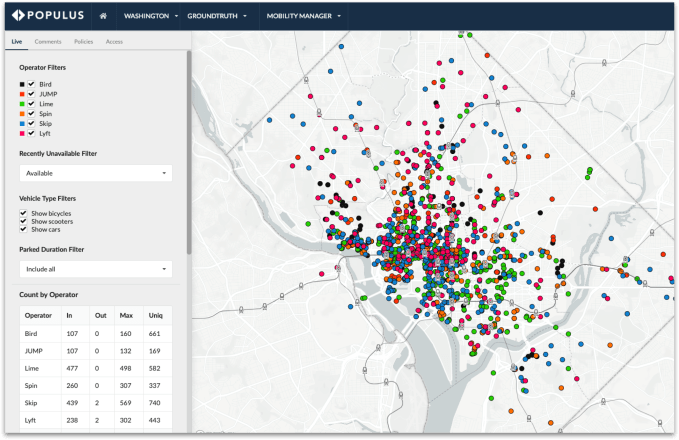Cities are seemingly down for this new era of transportation, which entails micromobility services and ride hailing, and operators are increasingly more down to share their data with cities. Now, cities just have to find out what to do with this data and how to extract learnings from it.
This is where Populus comes in. Populus, which just raised a $3.1 million seed round from Precursor Ventures, Relay Ventures and others, helps cities make sense of the influx of transportation data. This brings the startup’s total funding to $3.85 million.
The platform is designed to enable cities to access vehicle and trip data from shared-mobility operators. City planners can view where people park and ride scooters, for example, to better determine the best place to put scooter parking areas and dedicated lanes.
“One of the key issues that cities face around mobility services (in general), is that these services are arriving faster than most cities can keep up,” Populus CEO and co-founder Regina Clewlow told TechCrunch via email. “They are fundamentally changing transportation choices and travel patterns in ways that are unpredictable and unmeasured, making it very difficult for cities to design and manage public infrastructure (a job that only they can do). With access to better data and more importantly, information, we are finding that our customers, such as Arlington County in the D.C. area, are able to design infrastructure that can help shared mobility services grow safely and sustainably – such as new bike lanes and scooter corrals.”

To date, Populus works with Washington, DC and cities in the SF Bay Area and Los Angeles region. Given that most cities require shared-transportation operators to share data with them, it’s easy for Populus to come in as a third party. Populus also offers real-time data from rideshare companies to inform curbside management and pricing. Back in December, Populus partnered with Lime to facilitate data sharing from its car-share service, LimePod.
Populus works by having cities and operators purchase the platform on a subscription basis. Populus then securely ingests and hosts the data, and proceeds to offer tools to cities and operators to better understand how residents are using the transportation services in the city.
“Over the past decade we have seen an explosion of shared mobility services,” Precursor Ventures Managing Partner Charles Hudson said in a press release. “In order to fulfill their promises of delivering safer, equitable, and efficient streets, shared mobility operators will require platform partners like Populus to facilitate their continued growth. The Populus team’s deep technical and industry expertise are unparalleled. They’ve dedicated their careers to solving the worlds biggest urban problems, and they are building a game-changing platform that will transform the future of cities.”
Populus first launched its core product in September 2018. Clewlow says it was her work with co-founder Fletcher Foti back in 2012 that inspired this company. At the time, the two were working on software to help the Bay Area Regional Transportation agency forecast the next 30 years of travel. During that work, they witnessed cities struggle to understand what were new modes of transportation at the time offered by the likes of Uber and Lyft.
“We believed that with the rise of dockless mobility, cities would begin to start exerting their authority over managing city streets, and that data platforms would be essential to help private fleets and cities coordinate with one another to make progress on safety, efficiency, and equity goals,” Clewlow said.
Source: Tech Crunch Startups | Populus raises .1 million to help cities make sense of shared scooters and bikes
No Comments